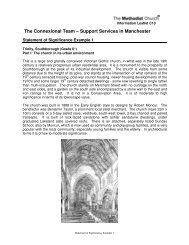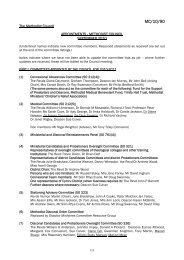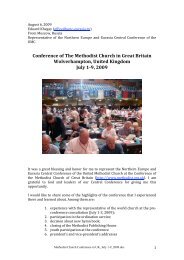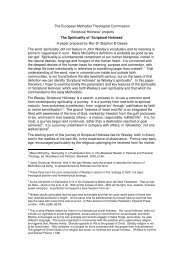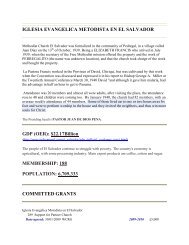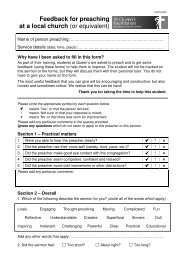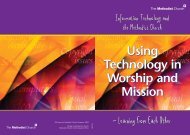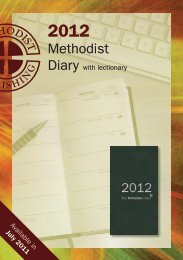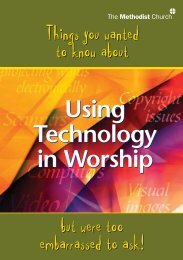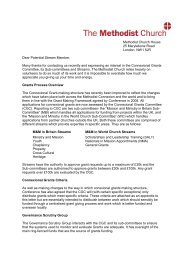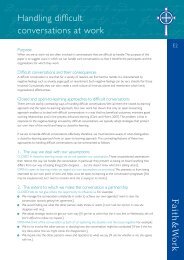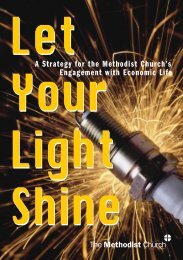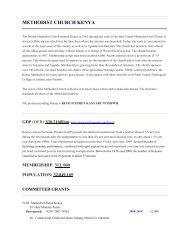Discipleship and the people called Methodists - BEH District
Discipleship and the people called Methodists - BEH District
Discipleship and the people called Methodists - BEH District
You also want an ePaper? Increase the reach of your titles
YUMPU automatically turns print PDFs into web optimized ePapers that Google loves.
Methodist classes was <strong>the</strong> need to raise money for <strong>the</strong> chapel. John Wesley had<br />
bought <strong>the</strong> New Room in Bristol, taking a sizeable debt upon himself. So had o<strong>the</strong>r<br />
Methodist preachers, <strong>and</strong> in 74 <strong>the</strong> leaders of several societies met to find<br />
a way to meet <strong>the</strong> building debts, <strong>the</strong> increasing costs of a growing movement.<br />
It was suggested that each member of a society be asked to give a penny a<br />
week for this purpose. However since <strong>the</strong> vast majority of <strong>Methodists</strong> were poor<br />
it was recognised that some would be unable to contribute. So it was decided<br />
that each class would have a leader who would take responsibility for visiting <strong>the</strong><br />
members <strong>and</strong> collecting <strong>the</strong>ir contributions. The class leaders would also commit<br />
<strong>the</strong>mselves to making up any shortfall when poor members couldn’t give, even<br />
though many were <strong>the</strong>mselves of modest means. This was agreed <strong>and</strong> serves as<br />
ano<strong>the</strong>r ‘str<strong>and</strong>’ leading to <strong>the</strong> arrival of <strong>the</strong> Methodist class system. The fact that<br />
money <strong>and</strong> <strong>the</strong> costs of buildings are so closely connected to Christian discipleship<br />
<strong>and</strong> <strong>the</strong> spiritual practice of giving is worth noting as ano<strong>the</strong>r moving <strong>and</strong> intensely<br />
practical example of ‘looking after each o<strong>the</strong>r in love’ within a disciple-making<br />
movement.<br />
What was stated above about <strong>Methodists</strong> from o<strong>the</strong>r parts of <strong>the</strong> world <strong>and</strong><br />
fasting could also be said about tithing (<strong>the</strong> spiritual practice of giving <strong>the</strong> first part<br />
of your money – ti<strong>the</strong> means a tenth – ‘back to God’ <strong>and</strong> be willing to live gladly<br />
on what is left). While many British <strong>Methodists</strong> are ‘good givers’ tithing doesn’t<br />
appear to be as common among us as for o<strong>the</strong>r parts of <strong>the</strong> Methodist ‘family’, or<br />
for several o<strong>the</strong>r Christian groupings. Though some of us squeal at <strong>the</strong> <strong>the</strong>ology,<br />
our bro<strong>the</strong>rs <strong>and</strong> sisters in Christ sometimes suggest that we are as ‘poor’ as we<br />
are, in terms of spiritual passion, life <strong>and</strong> hope, because we do not ‘give’.<br />
‘Every home a church. Every church a mission. Every member a ti<strong>the</strong>r.’ A<br />
statement of <strong>the</strong> Methodist Church in Brazil. What do you make of it?<br />
While <strong>the</strong> society Rules don’t mention ‘giving’ <strong>the</strong>y do instruct Methodist disciples<br />
not to ‘lay up treasure on earth’. This plainly refers to Jesus’ teaching:<br />
‘Do not store up for yourselves treasures on earth… but store<br />
up… treasures in heaven… For where your treasure is, <strong>the</strong>re<br />
your heart will be also.’ (Mat<strong>the</strong>w 6: 9- )<br />
4



